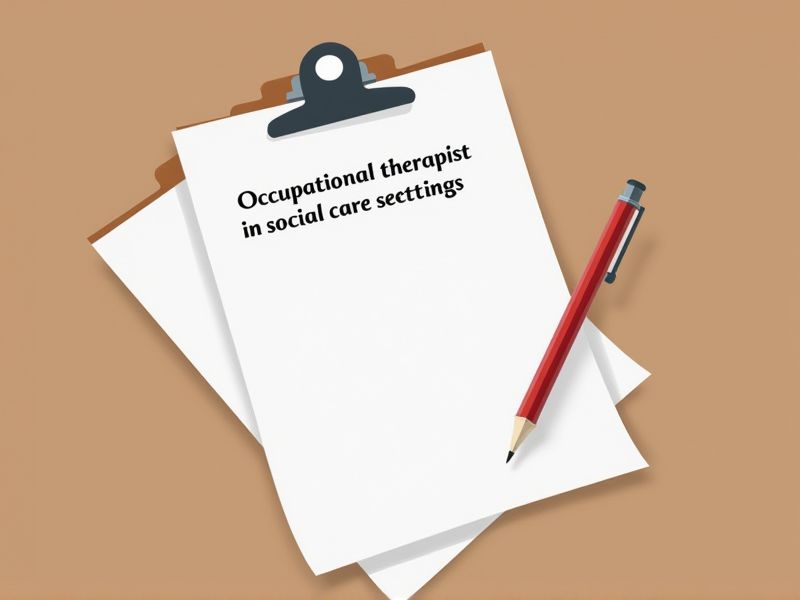
Occupational therapists in social care settings must navigate complex client needs, necessitating proficient skills and knowledge. Certifications ensure these therapists are equipped to deliver specialized interventions and support. Rigorous certification requirements also enhance the credibility and trust placed in therapists by clients and their families. Here are several key certifications required for occupational therapists working within social care settings.
NBCOT Certification
NBCOT certification ensures that occupational therapists have met a standardized level of competency and knowledge required for effective practice. In social care settings, this standardization helps maintain consistency in the quality of care provided to clients across different facilities. Employers and clients trust certified professionals more, which enhances job opportunities and professional credibility. Certified therapists are more equipped with the skills necessary to adapt to diverse patient needs, thereby improving overall client outcomes.
State Occupational Therapy License
State Occupational Therapy Licenses are essential to ensure that occupational therapists meet standardized professional qualifications, safeguarding quality care. Without such a license, therapists may lack the legal authority to practice, potentially risking compliance violations. Licensing also acts as a vetting process, confirming that therapists adhere to ethical guidelines and continuing education requirements. In social care settings, this prevents malpractice and promotes trust among clients and stakeholders.
Certified Aging-in-Place Specialist (CAPS)
Occupational therapists working in social care settings may encounter a growing population of older adults choosing to age in place, requiring CAPS certification for effective service. This certification provides specialized knowledge in home modifications and accessibility, ensuring therapists can recommend practical adaptations that enhance safety and independence. As people age, the likelihood of developing mobility or cognitive issues increases, making professional guidance crucial for maintaining quality of life. Without CAPS expertise, therapists might miss opportunities to create optimal environments that prevent accidents and promote well-being.
Certified Dementia Practitioner (CDP)
Occupational therapists in social care settings often work with individuals who have dementia, and being a Certified Dementia Practitioner (CDP) provides them with specialized skills tailored for dementia care. This certification ensures that they can implement evidence-based interventions that enhance the quality of life for dementia patients. Understanding dementia-specific challenges enables therapists to create personalized care plans. This expertise fosters better communication and collaboration with families and other professionals, leading to more comprehensive care solutions.
Certified Brain Injury Specialist (CBIS)
The presence of a Certified Brain Injury Specialist (CBIS) in social care settings ensures a higher standard of individualized care for clients with brain injuries. CBIS training equips occupational therapists with specialized knowledge that enhances their ability to assess and address complex rehabilitation needs. Improved outcomes for clients often result from the therapist's competence in implementing evidence-based strategies. Staff morale and professional development can also benefit significantly from having a CBIS-certified therapist onboard.
Certified Occupational Therapy Manager (COTM)
Certified Occupational Therapy Managers (COTM) play a critical role in enhancing the effectiveness of occupational therapists in social care settings by providing specialized leadership and management skills. Certification ensures that these managers are equipped to address administrative challenges efficiently, leading to more streamlined operations within their teams. The presence of a COTM contributes to improved patient outcomes, as therapists can focus more on individualized care rather than organizational tasks. Skilled management facilitates better resource allocation and policy implementation, which directly impacts the quality of care delivered.
Mental Health First Aid Certification
Occupational therapists in social care settings often encounter clients with mental health challenges, necessitating a Mental Health First Aid Certification to effectively identify and respond to these issues. This certification equips therapists with the necessary skills to provide immediate support in crisis situations, thereby enhancing client safety and well-being. Understanding mental health nuances can prevent misinterpretation of behaviors, fostering a more empathetic and supportive care environment. Incorporating mental health training into their skillset enables therapists to integrate holistic care strategies, improving overall treatment outcomes for clients.
CPR and First Aid Certification
Occupational therapists in social care settings often encounter emergency situations that require immediate response, and CPR and First Aid Certification equip them with the necessary skills to act quickly and effectively. Having these certifications ensures that therapists can manage critical incidents and contribute to the overall safety and well-being of clients. Employers in social care settings often mandate this certification to comply with regulatory standards and demonstrate a commitment to high-quality care. Certified occupational therapists may also experience increased confidence and effectiveness in their roles, positively impacting client outcomes.
Certified Sensory Integration Therapist (CSIT)
The need for Certified Sensory Integration Therapist (CSIT) in occupational therapy arises from the increasing recognition of sensory processing disorders in various populations, impacting daily functioning and quality of life. Having a CSIT within social care settings enhances the ability of therapists to develop personalized interventions, leading to improved outcomes. With specialized training, CSITs offer insights into complex sensory challenges faced by individuals with developmental disabilities or trauma. In social care, their expertise aids in creating environments that facilitate better communication and participation for clients.
Certified Assistive Technology Professional (ATP)
In social care settings, having a Certified Assistive Technology Professional (ATP) ensures that occupational therapists deliver more effective and individualized care. Inside these environments, ATP-certified individuals provide expert guidance on selecting and implementing assistive technologies, leading to improved outcomes for clients with disabilities. The expertise of an ATP helps in identifying the most suitable and innovative technology solutions, enhancing clients' daily living skills and independence. The integration of assistive technology by certified professionals often results in more efficient resource allocation and cost-effective care strategies, benefiting both clients and care providers.
Summary
You can expect improved job opportunities when you obtain certifications as an occupational therapist in social care settings. This certification often results in increased credibility and trust with clients and colleagues. Higher qualifications typically lead to enhanced professional skills, directly impacting the quality of care provided. Greater recognition from peers and employers is a common outcome, often contributing to career advancement.
